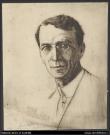Bertram Stevens was born at Inverell, New South Wales. In 1882 he moved with his family to Sydney where he was educated at public schools. In 1895 he began a fifteen-year period as a solicitor's clerk. During this time he read widely and worked as a freelance journalist, coming into contact with a number of literary figures. He was a founding member of the Dawn and Dusk Club, a society of artists and writers that included Victor J. Daley, Frederick John Broomfield, Norman Lindsay, Henry Lawson and Randolph Bedford; and John Le Gay Brereton (qq.v.) was the best man at his wedding.
Stevens is an important figure in Australian literature for his contributions as an editor of books and magazines. He was the editor of the Anthology of Australian Verse (1906), the first significant volume of its type. The collection was expanded and re-issued in 1909 as The Golden Treasury of Australian Verse. Stevens edited the first five issues of the Melbourne based Native Companion (1907), but resigned because of the difficulty of editing such a journal from Sydney. Subsequently he edited or co-edited a series of magazines, including the Bulletin's 'Red Page' (1909-1910), the Lone Hand (1912-1918), Art in Australia (1916-1922) and the Home (1920-1922). However, not immune to criticism, Stevens was attacked by A. G. Stephens in the Bookfellow for the quality of the Lone Hand and he suffered similar attacks from Norman Lindsay who failed in his attempt to take over Art in Australia for his Vision project.
Stevens edited several anthologies for children and the verse of individual poets, including John Farrell's My Sundowner and Other Poems (1904), George Essex Evans' The Secret Key and Other Verses (1906), Victor Daley's Wine and Roses (1911) and an edition of the poems of Henry Kendall. For many of these he included a short memoir. The proceeds from the posthumous Farrell and Daley volumes went to their families. Stevens also helped other writers and artists such as Henry Lawson, actions that encouraged Alfred Deakin to establish the Commonwealth Literary Fund.
In 1922 Stevens died of a cerebral haemorrhage. He received public praise from many writers, including Lawson, and his family was assisted financially when George Robertson bought his papers for the Mitchell Library.
 334978380879716546.jpg
334978380879716546.jpg